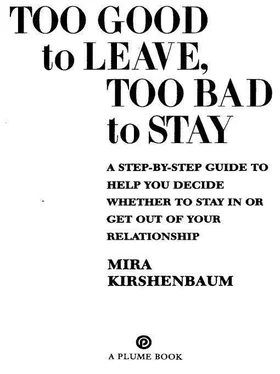Kirshenbaum, Mira - Too Good to Leave, Too Bad to Stay
Здесь есть возможность читать онлайн «Kirshenbaum, Mira - Too Good to Leave, Too Bad to Stay» весь текст электронной книги совершенно бесплатно (целиком полную версию без сокращений). В некоторых случаях можно слушать аудио, скачать через торрент в формате fb2 и присутствует краткое содержание. Жанр: Психология. Описание произведения, (предисловие) а так же отзывы посетителей доступны на портале библиотеки ЛибКат.
- Название:Too Good to Leave, Too Bad to Stay
- Автор:
- Жанр:
- Год:неизвестен
- ISBN:нет данных
- Рейтинг книги:3 / 5. Голосов: 1
-
Избранное:Добавить в избранное
- Отзывы:
-
Ваша оценка:
- 60
- 1
- 2
- 3
- 4
- 5
Too Good to Leave, Too Bad to Stay: краткое содержание, описание и аннотация
Предлагаем к чтению аннотацию, описание, краткое содержание или предисловие (зависит от того, что написал сам автор книги «Too Good to Leave, Too Bad to Stay»). Если вы не нашли необходимую информацию о книге — напишите в комментариях, мы постараемся отыскать её.
Too Good to Leave, Too Bad to Stay — читать онлайн бесплатно полную книгу (весь текст) целиком
Ниже представлен текст книги, разбитый по страницам. Система сохранения места последней прочитанной страницы, позволяет с удобством читать онлайн бесплатно книгу «Too Good to Leave, Too Bad to Stay», без необходимости каждый раз заново искать на чём Вы остановились. Поставьте закладку, и сможете в любой момент перейти на страницу, на которой закончили чтение.
Интервал:
Закладка:
That’s why guideline #7 applies.
STEP #8: THE RIGHT NOT TO BE HUMILIATED
The issue of power in relationships is so important that I’ve got to make sure I help everyone who couldn’t bring herself to answer yes to question #7 but who’s still stuck in a relationship with an impossible power person. But how could that be? you might wonder. If your partner makes you feel your needs are obliterated, wouldn’t you know that?
Not necessarily. Something I’ve noticed over and over through the years is the all-too-tragic way men and women get swept up in admiration of power people. Yes, they’ll say, my partner is domineering and overwhelming, but, gee, he’s so wonderful, too, so smart, so capable. Yes, my needs are obliterated, but I’m just a ninny (they say to themselves). Maybe I shouldn’t really have those needs.
What makes it all so confusing is that while power people spoil our lives and are certainly controlling, people who are controlling are often people who are in control, and people who are in control are often people we admire most and feel safest with.
So how do you distinguish between (1) your being trapped by a power person who hoodwinks you into believing among other things that he’s “in control” and (2) someone else who’s not a power person but who’s just very strong and competent and whose being in control conveys a sense of power? If you’re trying to decide if you’ll be happiest staying or leaving, you need help sorting this out.
Another reason you might not see that your needs are being obliterated is that some consummately subtle power people always know when to stop one step short of your consciously feeling your needs are obliterated. If you fall into this category, you’ll sincerely answer no to question #7 because of the way now and then one of your needs does get satisfied. And yet you’re miserable anyway.
Let me try to help.
Diagnostic question #8. Do you have a basic, recurring, never-completely-going-away feeling of humiliation or invisibility in your relationship?
This is a question about how you feel in the relationship with respect to your partner’s power. Let’s go back to Vinnie and Rosemary. To put it bluntly, Vinnie made Rosemary feel like a nothing, constantly defeated and frustrated.
There’s a flush-faced feeling of humiliation, a hollow-chested sense of being invisible, that never goes away when you are in a relationship with a power person. Almost every day he or she makes you feel like nothing, like a nobody. Clearly, having your needs obliterated will do this. But it doesn’t have to be so dramatic. You may not have some strong “need” to be listened to when you talk about what your day was like or about some thoughts you’ve had about the children, but if your partner’s Is power shuts you up, then that’s a slap in the face and you burn with humiliation.
There are two main ways people express their feelings of humiliation or invisibility: rage and depression. When the others power makes you feel like nothing, you want to destroy them or you want to destroy yourself.
Now it may be that you’re directly aware of the fact that your partner makes you feel this way. Not just occasionally—that happens to almost everyone—but most of the time on the surface and deep down, always. But if you’re not sure, if you can’t say you’d label the way you feel “invisible” or “humiliated,” then here are some instances of what other people have felt or gone through. Perhaps these will help make your situation clear to you:
• One mild-mannered man whose wife’s powerful personality dominated him was shocked to realize that during or after almost every prolonged interaction with her he had thoughts of bludgeoning her to death. (A fantasy like this once in a blue moon doesn’t necessarily mean you’re being humiliated; it probably just means you’re angry.)
• One man came home from work most days to find that his wife had a long list of problems for him to take care of and she tried to control not only what he did but how he did it and when he did it and even how he felt about doing it. Almost every night going to sleep he planned ways to kill himself.
• One woman’s partner topped everything she said. If she said she was tired, her partner was completely exhausted. If she talked about applying for a new job in her company, her partner talked about making a major career move. These power moves made the woman feel like a nothing and put her on what she called the “choo-choo of misery”: a train of depressing thoughts that began with her feeling she wasn’t important and led to feeling that her life was a complete waste.
• One woman found that every time she cooked for her domineering husband she had vivid, persisting fantasies of poisoning his food and his dying in pain.
• One man’s partner constantly ordered him about but did so in a polite, even seemingly sweet way so that she made him furious, and yet on the few occasions when he’d expressed his anger she’d made him feel so completely in the wrong that for years he swallowed his anger and yet it stayed with him like a hastily swallowed, undercooked doughnut.
GUIDELINE #8
If your partner gives you a basic, recurring, never-completely-going-away feeling of humiliation or invisibility, then you’re in the kind of situation that people report they were happy they left and unhappy they stayed in. Quick take: Humiliation is the barometer of hatred.
Humiliation is an important clue to the fact that your partner’s ability to dominate you has made the relationship too bad to stay in. And you measure humiliation by the degree to which your thoughts are filled with fantasies of violence toward the other person or toward yourself, the degree to which you go through your days blue or furious. Just as important, these thoughts or feelings seem to be correlated with contact between you and your partner, typically increasing just before, during, or after any humiliating interaction.
The Humiliation Trap
You have to beware of the humiliation that comes from being in a relationship with a power person. If you don’t understand the degree to which it’s destroying your happiness and peace of mind, it will keep you trapped in that relationship and trapped in ambivalence about that relationship.
Those violent fantasies and angry feelings seduce you into schemes of revenge, like a gambler obsessed with the thought of recouping his losses. Instead of pushing you out of the relationship, they suck you more deeply into it, because you develop the sick sense that recovering your pride and satisfaction lies in dominating or at least undermining the person who’s put the whammy on you for so long. That’s the humiliation trap.
And it works the same way with feelings of invisibility. Someone who makes you feel as though you don’t exist, as though you were nothing, can trap you into endless efforts to get his attention. Unfortunately, you can grab someone’s attention most effectively by acting sick or crazy. This is so common that whenever I see someone in therapy who’s been acting sick or crazy or self-destructive in any attention-grabbing way I check to see if they’re in a relationship with someone who makes them feel like they’re nothing.
It’s a mistake to think that unhappy, unsatisfying relationships generally end in divorce. Sometimes they dig both partners more deeply into marriage. There are many long-term marriages in which both people are slaves of hatred and misery. And many of them began with the ensnaring drama of power and humiliation.
It’s hard for most of us to go through a typical day outside the home without some humiliating incident, however trivial, without some frustrating reminder of how limited our power is, how unimportant we are. The relationships we want to spend our lives in should be a refuge from this. If they are just a source of more humiliation, they’re not healthy places to stay in.
Читать дальшеИнтервал:
Закладка:
Похожие книги на «Too Good to Leave, Too Bad to Stay»
Представляем Вашему вниманию похожие книги на «Too Good to Leave, Too Bad to Stay» списком для выбора. Мы отобрали схожую по названию и смыслу литературу в надежде предоставить читателям больше вариантов отыскать новые, интересные, ещё непрочитанные произведения.
Обсуждение, отзывы о книге «Too Good to Leave, Too Bad to Stay» и просто собственные мнения читателей. Оставьте ваши комментарии, напишите, что Вы думаете о произведении, его смысле или главных героях. Укажите что конкретно понравилось, а что нет, и почему Вы так считаете.












